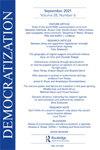Modelling temporal dynamics: does internet use fuel anti-government protests?
IF 2.9
1区 社会学
Q1 POLITICAL SCIENCE
引用次数: 0
Abstract
The past three decades have witnessed a rapid global uptake of digital media. Does an increase in internet access lead to more anti-government protests globally, in both democracies and non-democracies? Has the role of the internet changed over time from benefiting the opposition to benefiting the regime? We use time-series cross-national data and negative binomial regressions to model protest data in 151 countries from 1990 to 2020. By leveraging change in the development of digital information globally, the results show that increases in internet penetration and mobile cellular subscription rates increase the number of anti-government protests in non-democracies in the period from 1990 to 2010, but not among a subsample of democracies. After 2010, increases in internet penetration rates did not affect the number of protests in either democracies or non-democracies. The use of cellular internet continues to have a small positive effect on protest frequency after 2010. We also test the government's internet censorship efforts as a mechanism for decreasing information access and diminishing mobilization. Results suggest authoritarian regimes modified their strategies over time, more effectively using information and communications technologies (ICTs) to quell anti-government protests using digital repression and information control consistent with the theory of informational autocracy.时间动态建模:互联网的使用是否助长了反政府抗议?
过去三十年见证了全球对数字媒体的快速吸收。互联网接入的增加是否会导致全球范围内更多的反政府抗议,无论是在民主国家还是在非民主国家?随着时间的推移,互联网的角色是否从有利于反对派转变为有利于政府?我们使用时间序列跨国数据和负二项回归来模拟1990年至2020年151个国家的抗议数据。通过利用全球数字信息发展的变化,研究结果表明,1990年至2010年期间,互联网普及率和移动电话订阅率的提高增加了非民主国家反政府抗议活动的数量,但在民主国家的子样本中没有这种情况。2010年之后,互联网普及率的提高并没有影响民主国家或非民主国家的抗议活动数量。2010年后,移动互联网的使用继续对抗议频率产生微小的积极影响。我们还测试了政府的互联网审查作为一种减少信息获取和减少动员的机制。结果表明,随着时间的推移,专制政权修改了他们的策略,更有效地利用信息和通信技术(ict)来平息反政府抗议活动,使用符合信息专制理论的数字镇压和信息控制。
本文章由计算机程序翻译,如有差异,请以英文原文为准。
求助全文
约1分钟内获得全文
求助全文
来源期刊

Democratization
POLITICAL SCIENCE-
CiteScore
6.40
自引率
12.50%
发文量
73
期刊介绍:
Democratization aims to promote a better understanding of democratization - defined as the way democratic norms, institutions and practices evolve and are disseminated both within and across national and cultural boundaries. While the focus is on democratization viewed as a process, the journal also builds on the enduring interest in democracy itself and its analysis. The emphasis is contemporary and the approach comparative, with the publication of scholarly contributions about those areas where democratization is currently attracting considerable attention world-wide.
 求助内容:
求助内容: 应助结果提醒方式:
应助结果提醒方式:


